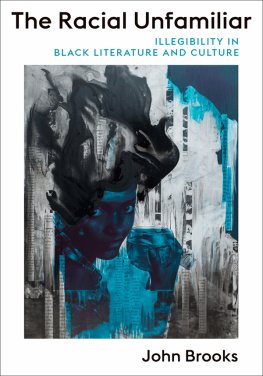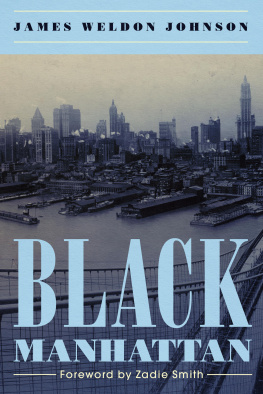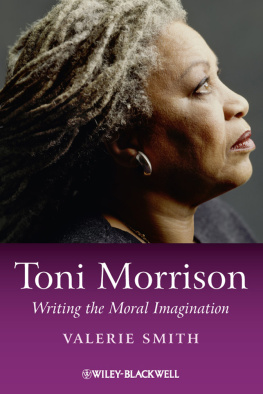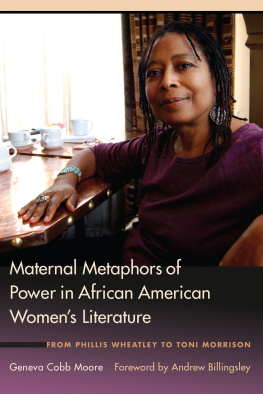Race and the Literary Encounter
BLACKS IN THE DIASPORA
editors
Herman L. Bennett
Kim D. Butler
Judith A. Byfield
Tracy Sharpley-Whiting
race and
the literary
encounter
Black Literature
from James
Weldon Johnson
to Percival Everett
Lesley Larkin

This book is a publication of
INDIANA UNIVERSITY PRESS
Office of Scholarly Publishing
Herman B Wells Library 350
1320 East 10th Street
Bloomington, Indiana 47405 USA
iupress.indiana.edu
2015 by Lesley Larkin
All rights reserved
No part of this book may be reproduced or utilized in any form or by any means, electronic or mechanical, including photocopying and recording, or by any information storage and retrieval system, without permission in writing from the publisher. The Association of American University Presses Resolution on Permissions constitutes the only exception to this prohibition.
The paper used in this publication meets the minimum requirements of the American National Standard for Information SciencesPermanence of Paper for Printed Library Materials, ANSI Z39.481992.
Manufactured in the United States of America
Library of Congress Cataloging-in-Publication Data
Larkin, Lesley.
Race and the literary encounter : black literature from James Weldon Johnson to Percival Everett / Lesley Larkin.
pages cm. (Blacks in the diaspora)
Includes bibliographical references and index.
ISBN 978-0-253-01758-1 (cloth : alk. paper) ISBN 978-0-253-01787-1 (pbk. : alk. paper) ISBN 978-0-253-01789-5 (ebook) 1. American literature African American authors History and criticism. 2. Race in literature. 3. Books and reading Social aspects United States. 4. African Americans Books and reading. 5. African Americans in literature. 6. Identity (Psychology) in literature. I. Title.
PS153.N5L37 2015
810.9'896073 dc23
2015033429
1 2 3 4 5 20 19 18 17 16 15
This book is dedicated to my mother, Kathleen Alexandra Frank, whose unconditional love animates everything I do.
The pleasure which I derived from reading had long been a necessity, and in the act of reading, that marvelous collaboration between the writers artful vision and the readers sense of life, I had become acquainted with other possible selves freer, more courageous and ingenuous and, during the course of the narrative at least, even wise.
RALPH ELLISON, SHADOW AND ACT
Contents
Acknowledgments
FIRST, THANK YOU TO THE EDITORS AND STAFF AT INDIANA University Press, including Robert Sloan, Jenna Whitaker, Darja Malcolm-Clarke, and Eric Levy, for believing in and supporting this project. You have been a pleasure to work with. Support for this book has also been provided by several institutions. I would like to thank the University of Washington for a Preparing Future Faculty grant and travel funding, Seattle Pacific University for a research and teaching fellowship, and Northern Michigan University for three Reassigned Time Awards, a Faculty Research Grant, and generous travel support. This book would not exist without the largesse of these institutions. I am also grateful to have taught, at each of these schools, smart and engaging students whose effort to engage in dialogue with African American literature is my primary inspiration.
I must also acknowledge the help and encouragement imparted by numerous mentors, colleagues, and friends. The English faculty at Linfield College particularly Lex Runciman and Barbara Seidman taught me that literature does real and lasting work in the world. I also owe tremendous thanks to the English and Comparative Literature faculty at the University of Washington, with special credit due to Carolyn Allen, Katherine Cummings, Gillian Harkins, Chandan Reddy, Cynthia Steele, and Alys Eve Weinbaum for shepherding me through the courses, projects, and dissertation that laid the groundwork for this book. To Alys, especially: your intelligence, empathy, rigor, and commitment continue to guide me. To the talented minds I studied alongside at the University of Washington, including Jeff Chiu, Lana Dalley, Jill Gatlin, Stacy Grooters, Kellie Holzer, Jennifer Ladino, Tamiko Nimura, Andrea Opitz, Amy Reddinger, Vince Schleitwiler, Todd Tietchen, Steve Tobias, and Ji-Young Um: thank you for your brilliance. Special acknowledgment is due to Jeff Chiu and Kellie Holzer, who read and responded to the earliest versions of this project with insight, creativity, and endurance. I am also deeply indebted to the inimitable Amy Reddinger, whom I have followed to the Upper Midwest and who has provided invaluable feedback on this project as well as food, shelter, and friendship during the long writing and revision process. To the English faculty at Seattle Pacific University particularly Fan Mayhall Gates and Doug Thorpe thank you for taking me under your wing as I began to work on this project in earnest. And to my accomplished, engaging, witty colleagues (former and current) at Northern Michigan University, including Lupe Arenillas, Shirley Brozzo, Stephen Burn, Sandy Burr, Lisa Eckert, Amy Hamilton, Alisa Hummell, Austin Hummell, April Lindala, Jaspal Singh, Linda Sirois, Raymond Ventre, and David Houston Wood: thank you for your friendship and intelligence. David Houston Wood deserves special thanks for his insightful comments on sections of this book and for his savvy professional advice, as does Stephen Burn for his extraordinary professional generosity and ongoing mentoring and collaboration. Above all, immeasurable thanks to Amy Hamilton, my constant interlocutor, co-conspirator, and friend. Thank you for arriving at NMU at just the right moment.
To the many friends who have put up with me over the last ten years (or more!), thank you for your humor and patience. Special thanks to Becky Bergman, Alisa Hummell, Sandy Sun, Sarah Wilson, and Vicki Wood for sticking with me even when I seem to drop off the face of the earth. To my parents, Thomas and Kathleen Frank: thank you for supporting everything I have ever done (however ill-conceived), for teaching me what really matters in life, and for your deep and abiding love of reading. Mom, I wish you were here to read this. Thank you to my sisters, Lyndsey Lynch and Whitney Frank, for always being there when I need you and for forgiving me when I havent been there for you. Thank you to my husband, Kellie Larkin, for supporting me through the long process of earning a PhD, landing a tenure-track job, and writing this book. Your willingness to talk with me about this project for over a decade is truly remarkable. And to my children, Killian and Alex: you are everything.
Race and the Literary Encounter
Art can, in other words, move into life. Not merely... by opening our eyes to life, not merely by giving us models of action and response, but by, quite literally, creating us.
ROBERT PENN WARREN, THE UNITY OF EXPERIENCE
Think of our lives and tell us your particularized world. Make up a story. Narrative is radical, creating us at the very moment it is being created.
TONI MORRISON, THE NOBEL LECTURE IN LITERATURE
Introduction
Scenes of Reading, Scenes of Racialization: Modern
and Contemporary Black Literature
ONE OF THE MOST CONTROVERSIAL FILMS OF THE LAST FIVE years, Lee Danielss Precious (2009) chronicles an abused African American teenagers development as a reader and writer. Adapted from Sapphires 1996 novel, Push, Preciouss story was heralded by many critics for its authentic[ity] (Ebert) and grit (Schmader). Others, however, asserted that the film reinforced racist stereotypes. Armond White called it a carnival of black degradation, and Melissa Harris-Lacewell wrote that the popular embrace of the film had troubling political meaning. This debate also recalls longstanding arguments about how black artists should represent black people, especially where nonblack audiences are concerned. In the case of
Next page







